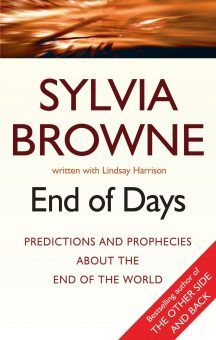Among the reasons I believe humankind has been historically fascinated with the subject of the end of the world is that, despite God’s promise over and over again that we’re all genetically eternal, our conscious minds find the earthly pattern of “beginning, middle, and end” much easier to grasp than the concept of eternity. We hear the fact that on the Other Side there is no such thing as time, that nothing exists but a perpetual “now,” and we understandably find it impossible to imagine, since on Earth we’re virtually obsessed with time. We’re told by brilliant theologians and spiritual leaders that this planet is not our real Home at all, that our blissful, sacred Home is waiting patiently for us to leave our bodies and get back there where we belong, but we can’t consciously remember having lived anywhere else, so how can somewhere else be “Home”?
All things considered, then, it can’t be too surprising that a “beginning, middle, and end”-oriented society—consumed with the notion of time-related questions like “when?” and “how much longer? ” and clinging fiercely to Earth in the mistaken belief that it’s the only Home we know—wants answers, always has and always will.
Whether or not the following chapters provide answers or simply raise more questions, at least we’ll know that just by asking, we’re expressing curiosity about a subject as timeless as humankind itself.
CHAPTER TWO
Ancient Beliefs About Doomsday
It’s an undeniable facet of human nature that we somehow feel more secure if we know the end of a story, especially when it’s our story. We don’t like loose threads. We don’t like unanswered questions or unsolved mysteries or uncertainty. We don’t like not knowing what’s waiting for us around the corner and, if it might hurt us, what we can do to avoid it or prepare for it. It’s the inherent belief of humankind that “forewarned is forearmed.” And we’ve held that belief for as long as humankind has existed on Earth.
Ancient civilizations were every bit as determined as we are to piece together the puzzle of the end of our story on this earth, and the story of this earth itself. They used the same tools we use today to figure it out: some combination of their religious beliefs, their bodies of experience, and the information they had at hand. Their doomsday scenarios ranged from the optimistic to the truly depressing—again, no different from our current “sophisticated, educated” theories except for the vocabularies and details. But when it’s all said and done, they were as earnest as we are to come up with the truth about what may be the first question ever asked on this planet: “How does our story end?”
The Incas
The Inca empire of South America was once the largest nations on Earth, sprawling two thousand five hundred miles along the Andes mountain range. The origins of the Incan civilization are cloaked in myth and mystery, preserved mostly through the spoken word from one generation to the next when their recorded history was destroyed, and their vast wealth pirated, by Spanish conquistadors in 1532.
Pages: 1 2 3 4 5 6 7 8 9 10 11 12 13 14 15 16 17 18 19 20 21 22 23 24 25 26 27 28 29 30 31 32 33 34 35 36 37 38 39 40 41 42 43 44 45 46 47 48 49 50 51 52 53 54 55 56 57 58 59 60 61 62 63 64 65 66 67 68 69 70 71 72 73 74 75 76 77 78 79 80 81 82 83 84 85 86 87 88 89 90 91 92 93 94 95 96 97 98 99 100 101 102 103 104 105 106 107 108 109 110 111 112 113 114 115 116 117 118 119 120




